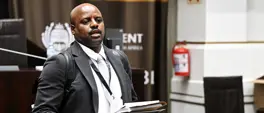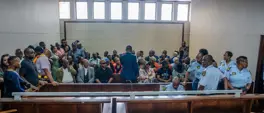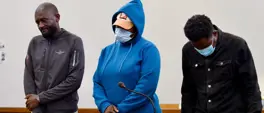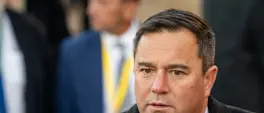JUDITH FEBRUARY & CHRIS OXTOBY | One step closer to a new Deputy Chief Justice: Why it matters
Judith February & Chris Oxtoby
5 July 2025 | 12:30The appointment, when it comes, will be long overdue. Justice Mandisa Maya, the previous DCJ, was appointed as Chief Justice in July 2024, and the position has been vacant ever since.
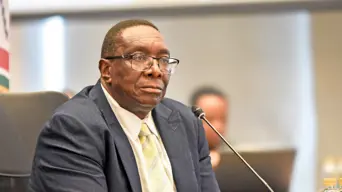
Gauteng Judge President Dunstan Mlambo. Picture: @OCJ_RSA/X
After interviewing three nominated candidates, the Judicial Service Commission (JSC) has found that Judge President Dunstan Mlambo, the head of the Gauteng High Court, was suitable for appointment as South Africa’s next Deputy Chief Justice (DCJ).
This concludes the process of consultation with the JSC that the Constitution requires.
Once consultation with the leaders of parties represented in the National Assembly has been concluded, the president will be able to make the appointment.
The appointment, when it comes, will be long overdue. Justice Mandisa Maya, the previous DCJ, was appointed as Chief Justice in July 2024, and the position has been vacant ever since.
Maya is probably as relieved as anyone that the long wait to fill the position is coming to an end. When interviewed before she was appointed Chief Justice in 2024, she described the job of leading the judiciary as a “sobering experience”, and in a tongue in cheek remark that likely carries more than a hint of truth, told outgoing Chief Justice Raymond Zondo that there was “absolutely nothing attractive” about the position she was to inherit from him.
Considering the extent to which the position of Chief Justice has expanded in recent years, a degree of world-weariness is understandable. The Chief Justice, and by extension the whole judiciary, will benefit from having an able deputy in place permanently, to ease some of the leadership load.
The DCJ position is not ceremonial. The DCJ plays an important role in the handling of complaints against judges and may be required to deputise for the Chief Justice in a variety of roles as leader of the judiciary, including presiding over hearings of the Constitutional Court, chairing the JSC, and so on.
The DCJ must therefore be a judge of stature, who understands the functioning of the court system and who can be a jurisprudential leader commanding the respect of their colleagues.
The President nominated three candidates for the position: Judge President Mlambo, Free State Judge President Cagney Musi, and Northern Cape Judge President Pule Tlaletsi. The nomination of multiple candidates was an interesting decision.
The last time such a process was followed was when the President nominated four candidates for consideration as Chief Justice in 2022. The JSC interviews, which followed, were one of the commission’s most controversial, with candidates being treated unequally and, in some instances, manifestly unfairly – including Mlambo being ambushed with unsubstantiated allegations of sexual harassment.
Subsequently, the President nominated Justice Maya as the only candidate for appointment as DCJ and then Chief Justice. Whilst considering multiple candidates is commendable in principle, no one would have wished to see a repeat of the JSC’s 2022 fiasco.
Happily, these interviews went more smoothly, and it must be said that whilst the JSC process is not perfect (indeed, Freedom Under Law is involved in ongoing litigation with the Commission over the selection procedure it applied in its October 2023 interviews), there are signs of improvement in some of the JSC’s processes.
The establishment of an objections committee, for example, has helped to ensure that adverse comments are properly vetted before they are put to candidates. This appears to have helped to ensure that there were no instances of candidates being ambushed by unsubstantiated allegations this time around.
The JSC also applied a practice of allowing candidates an uninterrupted time to articulate their vision for what they would bring to the role of DCJ. Judge President Mlambo’s vision was particularly compelling, and it would be hard to quibble with the JSC’s finding that he would be suitable for appointment as DCJ.
The JSC’s approach of indicating that one candidate was considered suitable does raise interesting questions about how the commission sees its role in this process. For most other appointments, such as those to the High Court or Supreme Court of Appeal, the JSC effectively decides on who will be appointed, with the President merely acting as the final appointing authority. But for the appointment of the Chief Justice and Deputy Chief Justice, the Constitution requires that the JSC be consulted by the President before making the appointment.
In 2022, the JSC raised eyebrows by announcing that Justice Maya was its favoured candidate of the four nominees. Many felt that this exceeded its powers, as demonstrated when the President elected to appoint Justice Zondo instead. Following the latest interviews, the JSC said no more than that it would advise the President that Judge President Mlambo was suitable, refusing to make any further comment on the other two candidates.
Does this mean the other candidates were felt to be unsuitable, or merely that one candidate was found to be better? The JSC may need to give further thought to how it presents the results of this consultation process in future interviews.
Generally, the questions asked were unobjectionable, and it was a welcome relief that the haranguing of candidates, which was seen in 2022, was not a feature of these interviews. This is not to say that commissioners did not interrogate the candidates – Judge President Tlaletsi faced scrutiny for stating that he was not aware of incidents of sexual harassment in the judiciary, and Judge President Musi was placed under the spotlight for the assignment of the judge in the Nulane case, who had been subject to withering criticism by the Supreme Court of Appeal.
Indeed, one criticism that can be made of the JSC’s performance in these interviews is that commissioners tend to interrogate such issues well beyond the point where a candidate can add anything to their existing answers on the topic. During Judge President Musi’s interview, the Chief Justice ultimately intervened to make this point, and she would have been justified in doing so even sooner.
What happens now? The President will, hopefully soon, officially announce the appointment. He remains able to appoint any of the three candidates, although it would be surprising if he differed from the JSC’s suggestion in favour of Judge President Mlambo. Having a permanent DCJ in place can only benefit the judiciary as it strives to meet the many challenges it faces.
For the JSC, it faces a lengthy round of interviews when it next meets in October, including long-vacant positions on the Constitutional Court, which need to be filled urgently.
Hopefully, the relatively harmonious conduct of the DCJ interviews and the long-overdue filling of important judicial vacancies will be continued.
Get the whole picture 💡
Take a look at the topic timeline for all related articles.


